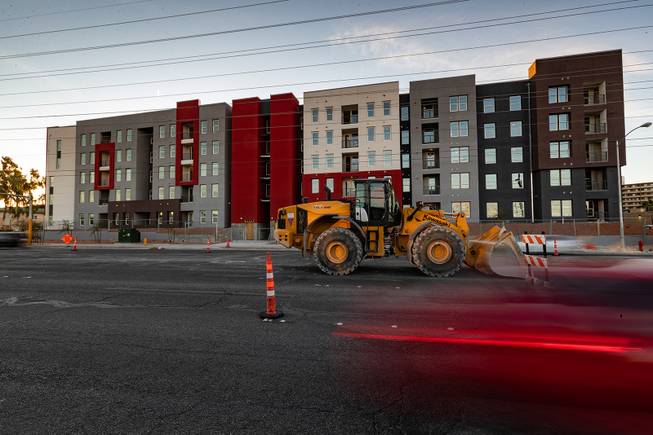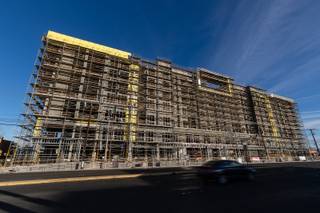
The under construction Degree student housing is seen here on Maryland Parkway, Wednesday, Dec. 26, 2018.
Wednesday, Jan. 2, 2019 | 2 a.m.
The area surrounding UNLV comprises an assortment of suburban-scale apartments and strip-mall retail plazas, and that’s pretty much the way it’s been for years. But this year, the University District will see the addition of two large-scale developments that will not only begin to transform the neighborhood, but will also change the feel of the campus itself.
The Degree, a 226-unit student apartment block located on the campus’ northeast corner, has moved past a series of construction delays and is now on schedule for completion in the first half of 2019. Leasing for the apartment block, a joint venture between UNLV and developer the Midby Companies, has begun for next autumn, and a Midby representative says that student response has been enthusiastic.
“The Degree adds apartment-style housing, which was not in our inventory,” says David Frommer, UNLV’s associate vice president of planning, construction and real estate. “We’re excited about the additional capacity, but we’re also excited about the different kind of living style it offers.”
A few blocks south on Maryland Parkway and adjacent to the campus’ Greenspun Hall is UNLV Gateway, a mixed-use collaboration between G2 Capital Development and UNLV that is on schedule to be completed next year. And that project—a seven-story tower that will include ground-floor retail (announced tenants include Peet’s Coffee and San Francisco-based chain Ike’s Love & Sandwiches), two floors of UNLV administrative offices, campus police headquarters and several floors of studio apartments—decisively extends UNLV’s footprint. The university has satellite offices on the east side of Maryland Parkway, but none of this scale.
“In moving some of our academic departments across the street, it creates a dynamic on both sides of Maryland Parkway. … It really starts to develop that idea of a university district, in terms of having faculty and staff crossing the street for different activities and needs,” Frommer says. “It begins to create the connection and energy we’ve long envisioned in the district.”
And as it did for Las Vegas’ Downtown and Arts District neighborhoods, that energy may begin to envelop the UNLV area all at once. There’s another apartment block—this one unaffiliated with UNLV—currently under construction on Tropicana Avenue, next to the campus’ South Residential Complex. And G2 Capital recently acquired the now-defunct Campus Village at the corner of Maryland Parkway and Harmon Avenue, former home to 1990s campus hangouts Café Espresso Roma and the Sports Pub. G2 founder Frank Marretti says that property will be demolished in the next few weeks, but the empty land won’t rest long.
“It’s going to be a very high-density mixed-use project. I anticipate it being north of 10 stories at various points,” Marretti says. “We believe the uses will include a hotel, offices, apartments, retail and parking.”
All of this is great news to Frommer, who says that much of UNLV’s east side may be destined to go vertical as well.
“On campus, we’re focusing on more dense, mid-rise development to best use our land assets. … You have to use what you have as effectively as you can,” Frommer says. “But there’s also the feel of campus. … Having some nice, open spaces and then some notable, attractive [buildings]—that creates a campus environment that people enjoy.”
But that’s tomorrow, Frommer says. For now, we should celebrate the openings of two major Maryland projects, and maybe keep an eye open for the groundbreaking of a third.
“I foresee a continued evolution of Maryland Parkway over the next 10 to 20 years. Even at a very fast pace, developing buildings can take several years,” Frommer says. “But we’re seeing it happen now, incrementally, in terms of private projects.”

